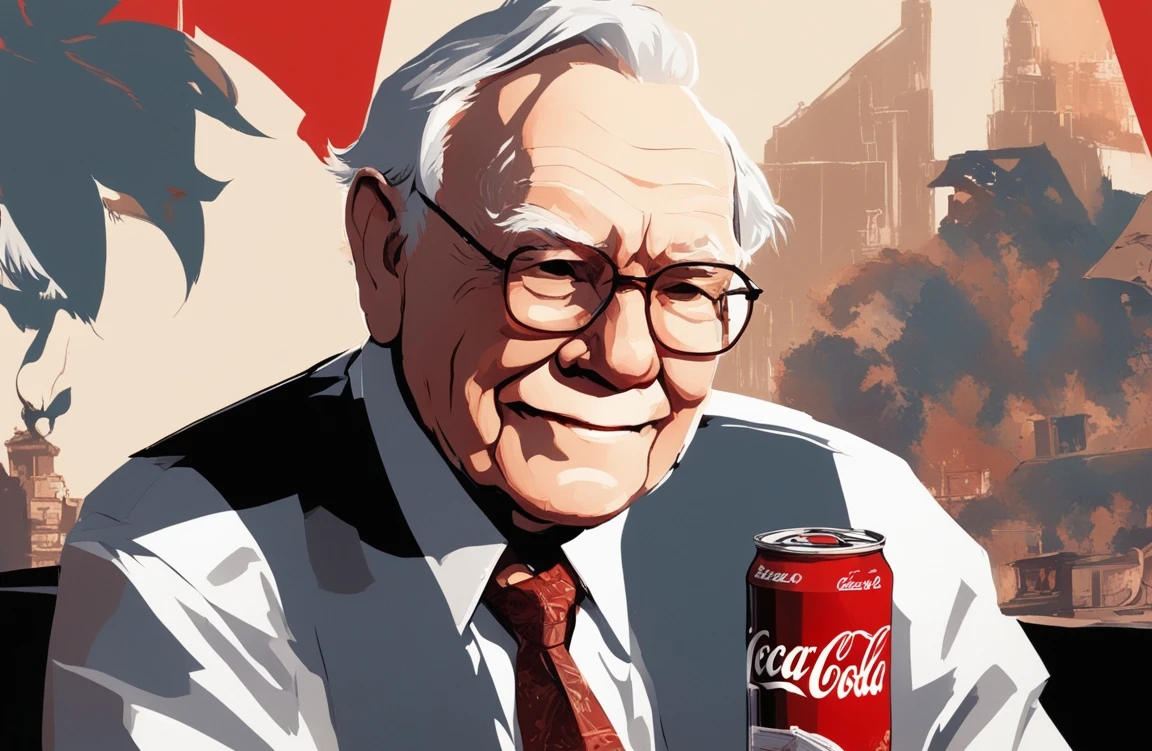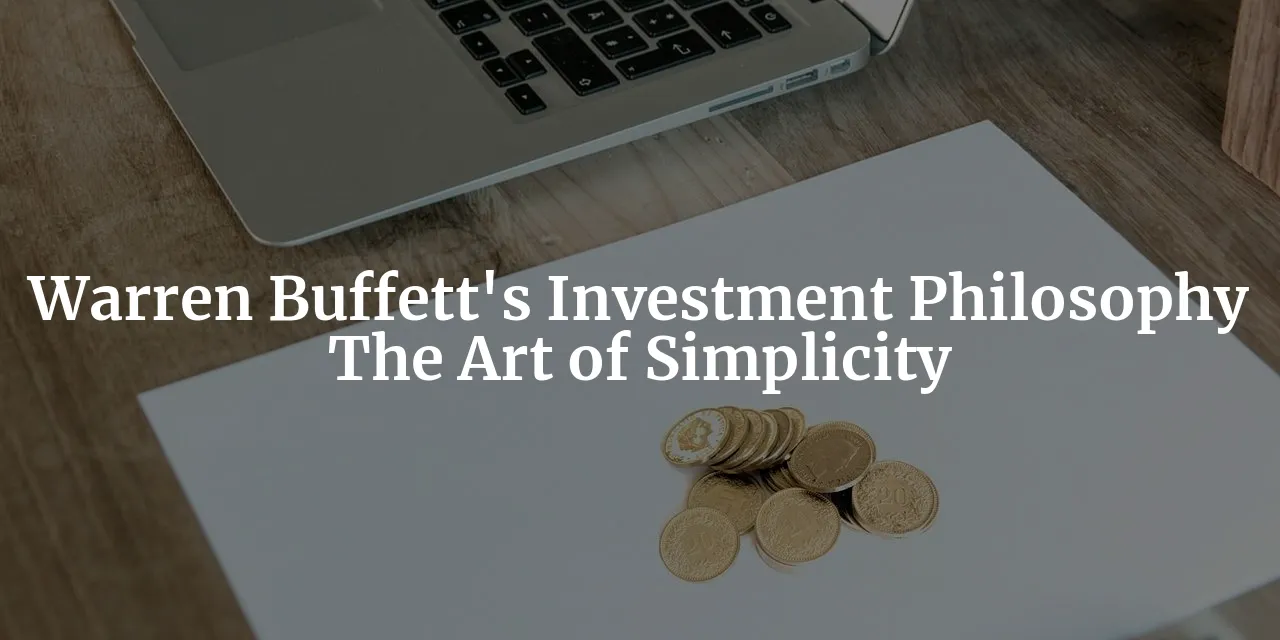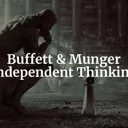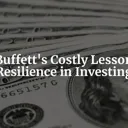Tags: Warren Buffett / Coca-Cola / History
This fanpage is not officially affiliated with Berkshire Hathaway: Disclaimer
Attention Berkshire Hathaway shareholders! Dive into the world of Warren Buffett's investment philosophy, characterized by simplicity, understanding, and long-term thinking. Explore the genesis of his approach, the success of his Coca-Cola investment, and his timeless wisdom that offers valuable lessons for navigating the complexities of financial markets. Don't miss out on this insightful journey into the art of simplicity in investing!

Introduction
In the pantheon of investment legends, Warren Buffett's name is often heralded as the greatest investor of our time. Renowned not only for his unparalleled investment acumen, Buffett is also celebrated for his significant contributions as a philanthropist 1 ↗. His journey into the world of investing was profoundly influenced by Benjamin Graham, the father of value investing, at Columbia Business School. This mentorship laid the foundation for what would become a revolutionary investment philosophy 4.
Buffett's approach can be encapsulated by the principle "Keep It Simple, Stupid" (KISS), a mantra that underscores the power of simplicity in the complex world of investing 6. This article aims to delve into how Warren Buffett's investment strategy, characterized by its emphasis on simplicity, long-term thinking, and a deep understanding of one's limits, has led to unparalleled success. Through anecdotes such as his significant stake in Coca-Cola, we will illustrate how Buffett's principles have been put into practice, shedding light on the lessons that Berkshire Hathaway shareholders and the broader investing community can learn from his approach 8 ↗.
As we explore the historic, political, and economic insights that have shaped Buffett's investment decisions, readers can expect a comprehensive analysis that not only celebrates his successes but also critically examines the principles that have guided his journey ↗. This exploration into the art of simplicity in investing, as practiced by Warren Buffett, promises to offer valuable lessons in both investment and life.
The Genesis of Buffett's Investment Philosophy
The roots of Warren Buffett's investment philosophy can be traced back to his time under the tutelage of Benjamin Graham at Columbia Business School. Graham, often referred to as the greatest investor of his time, introduced Buffett to the concept of value investing and the importance of intrinsic value. This foundational knowledge would become the cornerstone of Buffett's investment strategy 4.
Central to Graham's teachings was the principle of the "margin of safety," which posits that investors should only purchase securities when their market price is significantly below their intrinsic value. This principle not only minimizes the risk of loss but also maximizes the potential for gain, laying the groundwork for Buffett's future investment successes 4.
However, Buffett's strategy evolved beyond Graham's initial teachings. While Graham focused on finding undervalued companies, Buffett began to look for great companies at good prices. This nuanced approach allowed Buffett to invest in businesses like Coca-Cola, which, while not undervalued in the traditional sense, offered long-term value through brand strength and market dominance 8.
Long-term investment and a deep understanding of the business became central tenets of Buffett's strategy, contrasting sharply with the short-term speculation that characterizes much of the investment world. This approach is evident in Buffett's preference for companies with straightforward business models, such as his investment in Coca-Cola, which has remained one of Berkshire Hathaway's biggest holdings for decades 8.
Buffett's focus on the quality of senior leadership in his investments also reflects Graham's teachings on company management ↗. This emphasis on leadership underscores the belief that the caliber of a company's management team is a critical indicator of its investment potential 2.
Over the years, Buffett's investment strategy has evolved from a pure value investing approach to a more nuanced strategy that incorporates elements of brand value, company leadership, and long-term growth potential. This evolution highlights Buffett's ability to adapt his investment philosophy to changing market conditions while maintaining the core principles of simplicity, understanding, and patience.
Simplicity in Practice: The Coca-Cola Investment
In 1988, amidst a landscape of complex financial instruments and speculative investing, Warren Buffett made a decision that would become a cornerstone of his investment philosophy: he purchased more than $1 billion in shares of Coca-Cola, equivalent to 6.2% of the company at the time ↗. This move was not just a financial transaction but a declaration of belief in the power of simplicity in investing. Coca-Cola's business model was straightforward and globally recognized, embodying the kind of investment Buffett was drawn to—simple, understandable, and with a potential for long-term growth 8.
The rationale behind this investment was deeply rooted in Buffett's evolving philosophy, which had shifted from seeking out undervalued stocks to buying "great companies at good prices." Coca-Cola represented exactly this—a company with a solid, easy-to-understand business model and a product that was in demand worldwide. Its simplicity was its strength, aligning perfectly with the KISS principle of investing, which advocates for straightforward and easily understandable investments 7.
Since Buffett's initial investment, Coca-Cola's market cap has grown from $16 billion in 1988 to an astonishing $252 billion in 2023. This growth trajectory not only underscores the success of Buffett's strategy but also highlights the value of long-term investing in well-understood companies. Buffett's favorite holding period, "forever," is a testament to his commitment to long-term growth over short-term gains, a principle vividly illustrated by his enduring partnership with Coca-Cola 8.
Financially, Berkshire Hathaway's investment in Coca-Cola has been nothing short of spectacular. From the initial purchase of 23 million shares at $2.73 per share to holding over 400 million shares, the investment has multiplied many times over, delivering substantial dividends and stock appreciation. This case study serves as a powerful example to Berkshire Hathaway shareholders and the wider investing community of the value of simplicity, understanding, and long-term thinking in investment decisions 8.

Buffett's Wisdom: Quotes and Principles
Warren Buffett, often hailed as the greatest investor of all time, has distilled his investment philosophy into a series of quotes and principles that emphasize simplicity, understanding, and patience. "The Tao of Buffett," a collection of 125 Buffettesque quotes, encapsulates his wisdom, offering insights into his approach to investing and life 1.
One of Buffett's core principles is to invest in what you know. He advises investors to stay within their circle of competence and invest in businesses they understand. This principle ties back to the KISS rule of investing, emphasizing the importance of simplicity and clarity in investment decisions. Buffett's investment in Coca-Cola is a prime example of this principle in action—a straightforward business model that he understood and believed in 1.
Buffett's aversion to complex and risky investment strategies is another hallmark of his philosophy. He famously said, "The secret to getting rich is compound returns," highlighting the importance of long-term growth and the avoidance of high-cost investment funds. His bet on index funds in 2007, which significantly outperformed actively managed funds, underscores his belief in low-cost, simple investment strategies that are accessible to everyone 3.
Moreover, Buffett's wisdom extends to recognizing one's limitations and not overreaching. He advises investors to "stop investing in bad investments" and to "hold on to good ones," a principle that requires self-awareness and discipline. This mindset is crucial for making informed decisions that align with one's investment goals and risk tolerance 1.
Buffett's quotes and principles offer more than just investment advice; they provide a blueprint for making thoughtful decisions in business and personal finance. By adhering to the principles of understanding your investments, investing within your circle of competence, and embracing the power of compound returns, investors can navigate the complexities of the financial world with confidence and clarity.
Through his wisdom, Warren Buffett has demonstrated that simplicity, coupled with a deep understanding and a long-term perspective, is the foundation of successful investing. His principles not only guide seasoned investors but also offer valuable lessons for anyone looking to make informed and prudent financial decisions.
Criticism and Controversy: A Balanced View
Warren Buffett, often revered as the "Oracle of Omaha," has not been immune to criticism and controversy. Critics, particularly those inclined towards more aggressive or technology-driven investments, have occasionally poked holes in Buffett's traditional approach to investing 2. The debate around the effectiveness of value investing, especially in a modern, fast-paced financial world, continues to be a topic of discussion among investors and analysts alike.
Buffett's stance on broader economic and political issues, such as his opposition to the elimination of the estate tax and his criticism of the practice of releasing quarterly earnings guidance, further illustrates his unique perspective on the financial world. These positions underscore his belief in focusing on long-term performance rather than short-term gains 2.
Despite these criticisms, the resilience and profitability of Berkshire Hathaway during economic downturns, including the recent global pandemic, serve as a testament to the effectiveness of Buffett's investment strategy 2. This resilience is not just a counterpoint to critics but also a reflection of the enduring value of a well-thought-out investment philosophy.
The concept of "value" in investing has evolved over time, yet Buffett's approach highlights the importance of adaptability within the framework of a simple investment strategy. As financial markets become increasingly complex, the principles of value investing remain relevant, demonstrating the timeless nature of Buffett's strategies.
Concluding this section, it's clear that despite facing criticism, Warren Buffett's investment strategies have stood the test of time. Over several decades, his approach has not only generated immense wealth for investors but also offered a blueprint for successful investing that balances simplicity with adaptability.
The Future of Investing According to Buffett
Looking towards the future, Warren Buffett's principles of investing offer a beacon of simplicity amidst the complexity of global financial markets. Technological advancements and shifts in the global economy present both challenges and opportunities for investors. In this evolving landscape, Buffett's advice to stick with low-cost index funds remains particularly relevant for most investors 3. This strategy, exemplified by his successful bet on index funds in 2007, underscores the benefits of such funds, including their ability to outperform a significant percentage of actively managed funds over time 3.
The potential for simplicity in investment strategies, even as financial markets grow in complexity, cannot be overstated. Understanding and adapting to future market conditions, while adhering to core investment principles, will be crucial for the next generation of investors. Buffett's emphasis on the importance of ethical considerations and sustainability in investment decisions points to areas that are likely to gain prominence in the future.
Buffett's principles can be applied by the next generation of investors, emphasizing the timeless nature of his advice. His approach, which combines a deep understanding of businesses with a focus on long-term value, offers a model for navigating the uncertainties of future markets. The role of ethical considerations and sustainability, areas that Buffett has touched upon, are likely to become increasingly important in investment decisions.
Warren Buffett's impact on the investment world is profound. His legacy, characterized by a commitment to simplicity, value, and ethical considerations, offers a guiding light for future investment philosophies. As we look towards the future, the principles espoused by Buffett will continue to shape the approaches of both individual and institutional investors, demonstrating the enduring relevance of his investment wisdom.

Conclusion
In conclusion, the art of simplicity in investing, as exemplified by Warren Buffett, offers invaluable lessons for Berkshire Hathaway shareholders and the broader investing community. Buffett's investment philosophy, rooted in simplicity, understanding, and long-term thinking, has not only led to unparalleled success but also offers a timeless blueprint for navigating the complexities of financial markets.
The genesis of Buffett's investment philosophy, shaped by his mentorship under Benjamin Graham, laid the foundation for his revolutionary approach to investing. Emphasizing the margin of safety and the importance of intrinsic value, Buffett's strategy evolved to focus on great companies at good prices, as evidenced by his significant investment in Coca-Cola.
The Coca-Cola investment serves as a prime example of Buffett's principles in practice, highlighting the power of simplicity, understanding, and long-term growth potential. The enduring success of this investment underscores the value of adhering to Buffett's philosophy in investment decisions.
Buffett's wisdom, encapsulated in his quotes and principles, offers a guiding light for investors. His emphasis on investing in what one knows, the power of compound returns, and the importance of recognizing one's limitations provides a blueprint for making informed and prudent financial decisions.
While Buffett's approach has faced criticism and controversy, the resilience and profitability of Berkshire Hathaway during economic downturns serve as a testament to the effectiveness of his investment strategy. The enduring relevance of value investing principles in an increasingly complex financial world underscores the timeless nature of Buffett's strategies.
Looking towards the future, Buffett's principles offer a beacon of simplicity amidst the complexity of global financial markets. His emphasis on low-cost index funds, ethical considerations, and sustainability points to areas likely to gain prominence in the future of investing.
In closing, Warren Buffett's investment philosophy, characterized by simplicity, understanding, and long-term thinking, offers a timeless model for successful investing. As Berkshire Hathaway shareholders and the broader investing community reflect on Buffett's principles, they are encouraged to adopt a mindset of simplicity and focus in their financial endeavors. In the words of Buffett 5:
The interesting thing about business, it's not like the Olympics. You don't get any extra points for the fact that something's very hard to do. So you might as well just step over one-foot bars, instead of trying to jump over seven-foot bars.
This quote encapsulates Buffett's philosophy and serves as a reminder to embrace simplicity and focus in both financial and personal pursuits.
References
-
Warren Buffett's Words Of Wisdom - www.forbes.com ↩↩↩↩
-
Warren Buffett: An appreciation - www.mckinsey.com ↩↩↩↩
-
Billionaire Warren Buffett swears by this inexpensive investing strategy that anyone can try - www.cnbc.com ↩↩↩
-
Benjamin Graham's Timeless Investment Principles - www.investopedia.com ↩↩↩
-
With 15 Words, Warren Buffett Explained a Brutal Truth Most People Never Accept - www.inc.com ↩
-
KISS principle - Wikipedia - en.wikipedia.org ↩
-
What is the KISS Rule of Investing? A Comprehensive Guide - medium.com ↩
-
Why Did Warren Buffett Invest Heavily in Coca-Cola (KO) in the Late 1980s? - www.investopedia.com ↩↩↩↩↩↩












